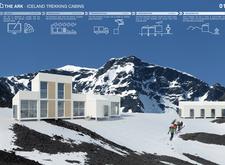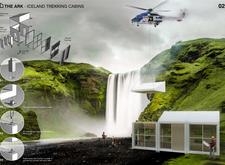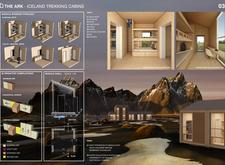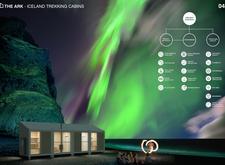5 key facts about this project
## Overview
Located in Iceland's dramatic landscape, "The Ark - Iceland Trekking Cabins" meets the increasing demand for sustainable accommodation tailored to trekkers and nature enthusiasts. The design focuses on modular architecture, emphasizing functional efficiency and environmental integration while ensuring a minimal ecological footprint. The cabins are intended to provide accessible shelter that enhances the outdoor experience.
## Modular Design Efficiency
The project employs a modular system that facilitates rapid assembly and transportation. The design process is streamlined into distinct phases: unit design takes approximately 10 to 15 days, factory assembly is completed in 20 to 30 days, and on-site assembly requires only 1 to 5 days. Helicopters are utilized for the transportation of components, signifying an innovative logistics method suitable for remote locations. The cabins feature interlocking modules characterized by clean lines and a predominantly white façade complemented by wooden vertical slats, fostering visual harmony with the surrounding environment.
## Sustainable Materiality and Functionality
Durable and sustainable materials are central to the design, including concrete for structural stability, engineered wood for warmth, expansive glass surfaces for natural light, and polyethylene for weatherproofing. Additionally, photovoltaic modules are integrated into the roofs to harness solar energy. The interior layout emphasizes functionality, featuring modular sleeping arrangements, utility areas equipped with kitchens and dining spaces, and shared amenities. The adaptability of configurations allows for customization based on the site-specific context and user requirements, further supporting the project's commitment to sustainability and resource efficiency.





















































